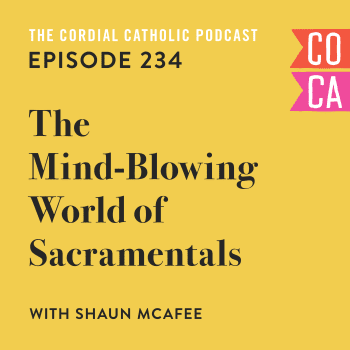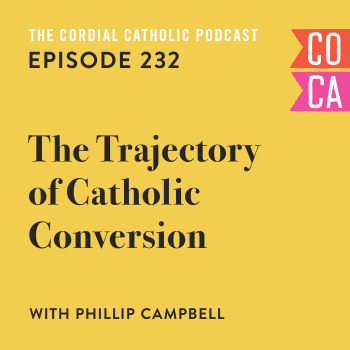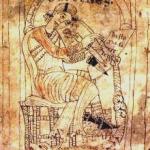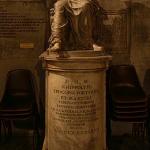
I once watched a debate on biblical authority between a Catholic priest and an Evangelical pastor.
It was going as well as a debate could go until the very end when the pastor wheeled a large suitcase onto the stage. He began, slowly, to unpack the contents of the suitcase onto his podium: four enormous tomes.
“This,” he declared dramatically, “Is everything you need to know to be a Catholic.”
He paused for effect before continuing, “And this is all you need to know to be a Protestant!” He confidently foisted his Bible into the air.
The contrast was shocking: Look at everything the Catholic Church added to the Bible; look at everything else you need to believe.
The priest, for his part, maintained his cool. Rising from his seat he said something, simple and profound, that has stuck with me ever since.
“Sure,” he said, “the Catholic Church has had new things to say in the two thousand years since the books of the Bible were written but you don’t need to know all that.
To be a Protestant, however, you must have read every single Bible commentary ever written, have studied all the ancient languages, have read every theological text from every Reformation tradition, and have studied the history of ancient Israel, Judaism as well as Roman, medieval, and modern history too.”
“To be a Protestant,” he said, “to rightly interpret the Bible for yourself you must be a linguist, theologian, historian, and philosopher.”
You must know everything.
Or how else can you get it right?
I remember when I first “got saved” as a zealous fifteen year old.
The first thing I did was find the nearest Christian book store and bought a massive Teen Study Bible.
Like most new Christians I had no clue what I was doing or where to begin and so I opened it up to the first page and began to read. And, like most new Christians with absolutely no clue what I was doing I quickly became bogged down and discouraged somewhere in the middle of Numbers.
What the Catholic priest was getting at during the debate, and what I learned first hand, years ago, was that without a guide we get a bit lost.
And without an interpreter, Scripture can be impossible to understand.
As an Evangelical, I grew up in a faith which understood that each person could interpret the Bible for themselves. We prayerfully argued that with the help of the Holy Spirit we could, on our own, come to the correct conclusion about even the most difficult passages of Scripture.
With the Bible and the Holy Spirit as our guides we could understand what we’re reading and make decisions, ultimately, on what we believed.
But in practice this proved to be a challenge and when a scandal over anti-dispensationalism swept through my high school youth group I can remember hours spent, at odds, over the interpretations of simple passages of Scripture.
If we’re all meant to put our hearts and minds into these things, I thought, then how come we’re all arriving at different conclusions.
I learned, years later, that our wasn’t an isolated case.
The Evangelical Church—and much of Protestantism—relies on the Bible alone for its rule of faith. What I didn’t understand then but have since become intimately acquainted with are the profound and, I would argue, ultimately ruinous effects of this theology.
Lacking a regula fidei or outside interpretive source an Evangelical reading of the Bible ultimately produces a thousand different interpretations of the same passages of Scripture because, like a bunch of teenagers in the upper room of our church hall, we can all come at the same text with our own views.
And who is to say who’s right?
A brief and even cursory glance across the landscape of Evangelical theology reveals this to be precisely the case. Denominations disagree with other denominations. Disagreements within denominations spawn church splits or, as if often the case, new denominations altogether. And many Evangelical churches, often times in frustration, shrug off the mantle of denominationalism altogether—but get no closer to a solution to the problem.
The problem, which is breaking the back of the Evangelical church is that a system which relies on the Bible alone, with no authoritative interpreter, is not a system which allows for unity, clarity, or peace.
Take something as fundamental as how a Christian is saved. Between the theologies of Free Grace, the Lordship of Christ, and N.T. Wright’s modern Pauline perspective and we have at least three major competing views held by Evangelical Churches.
All interpreting the same Scripture passages. All supported, this way and that, by the most educated, holy, and diligent scholars. All claiming to be fundamentally, and critically true.
And in disagreement with one another.
If salvation is the main issue, as Martin Luther wrote, on which the Church stands or falls then Evangelical Christianity has landed squarely on its face.
And it matters.
It matters dearly because Christ, in His last recorded prayer on earth, prayed expressly for Christian unity.
Visible unity.
And the Evangelical Church has nothing of the sort.
Instead, Evangelical dogma makes every Christian into the final authority on theology. Brian Matthews writes,
Because Scripture does not interpret itself but needs to be read and interpreted by someone, Scripture ultimately ceased to function as the final interpretive authority in deciding theological matters. Instead, a person’s individual reason and judgement becomes the final authority, resulting in a kind of subjectivism and theological chaos.
Scripture requires interpretation and if there were a plain sense meaning or if the Holy Spirit could truly guide us all towards the right interpretation then we would find some place, any place, where all of us could agree.
But we cannot.
And unless, like the Catholic priest from the debate said, we all become linguists, theologians, historians, and philosophers how can we possibly know enough about the context of the Scripture we’re trying to interpret to be fully confident we’ve got it right?
(Nevermind that the most renowned Evangelical scholars disagree amongst themselves.)
No, the Evangelical Church is broken because it relies on a system that, I’d argue, Christ never intended. Christ did not leave us a Bible and a Holy Spirit as interpreter. If He did, His system has failed. Look at how we can’t agree, even on the most major elements of what we believe.
Instead I’d argue, as Paul does in his letter to Timothy, that was Christ has really left us is the Church, “the pillar and bulwark of Truth.”
Consider, finally, the state of Evangelical Christianity across the world. In North America, Europe, Asia, and Africa. Consider the thousands of denominations which disagree not only on small things but the fundamentals, too. Imagine that this was, really, the Christian Church as Christ imagined?
That this was the Church Jesus said would never be overcome; a Church which He prayed would be visible unity, as He is united with the Father.
As an Evangelical, I found the proposition to be impossible: There’s no way this was it.
And there was no way the Bible was meant to be handled as it’s been.
A Church—instead of each person, their Bible, and their favourite collection of biblical scholars—was always meant to be the final arbiter and guardian of the Bible and its interpretation.
After all, it was the Church who collected the Bible, the Church who safeguarded it against heresies, the Church which developed dogmatic norms like the Trinity, and the Church which has preserved the succession of the apostles, in historic continuity, since last breath Christ took on earthly soil.
I love the Evangelical Church.
I loved being an Evangelical.
I cut my teeth as an Evangelical Christian and cut them deep.
I read my Bible, prayed, and worshipped alongside the most devout and wonderful Christians I have ever met. I went overseas, twice, and spent time bringing the Word of God to all kinds of places where I felt it needed to go. I’ve lead small groups, Bible studies, and campus outreaches. I’ve interned and volunteered and was even an incredibly poor worship leader at a middle school youth group.
I wouldn’t trade my Evangelical past for anything but it was in the Catholic Church, ultimately, were I finally found a solution to a broken situation.
And visible unity.
We were never meant to interpret our Bible on our own. We weren’t meant to have to all be Bible scholars, experts in history, theology, and philosophy. It wasn’t meant to work that way and, I think, if we’re honest it’s pretty obvious. Because none of us can agree, and that can’t be what Jesus wanted.
Instead, I submit for your consideration, another way.
Take it or leave it.
And go in prayer.

















